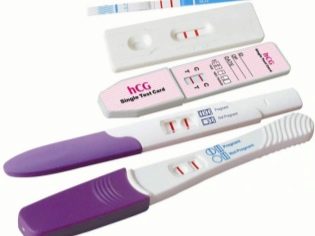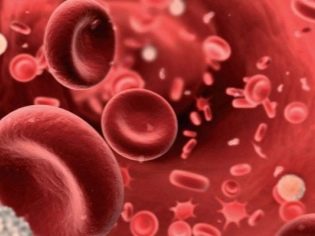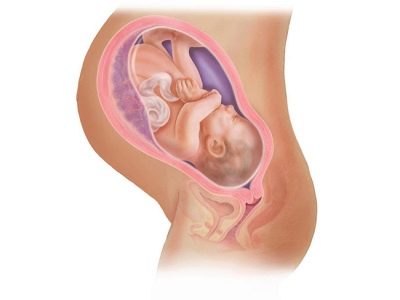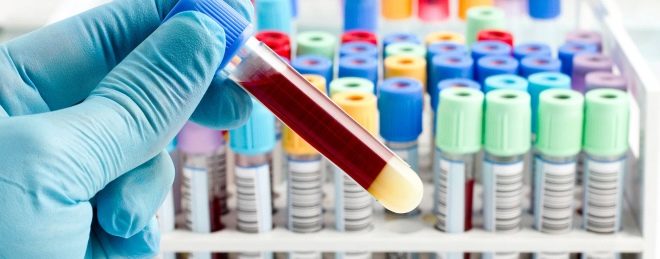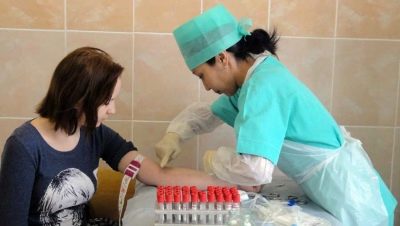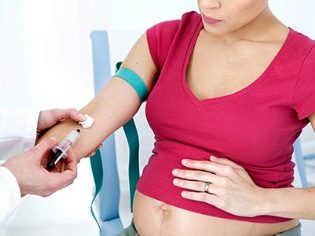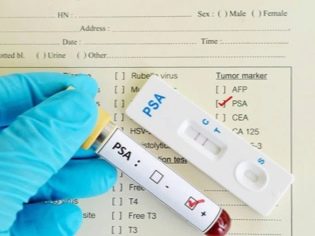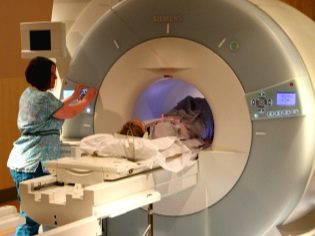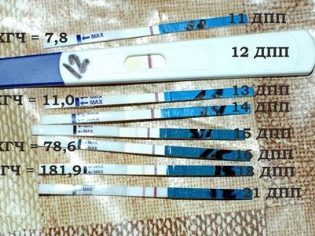How to and when to donate blood for hCG?
One of the important studies conducted during pregnancy is the determination of the level of hormones. One of these lab tests is a blood test for hCG.
What it is?
During pregnancy in the female body, quite a lot of new hormones are formed, with which he was not familiar before this period. One of these biologically active substances is chorionic gonadotropin. Its abbreviated name is HCG. Normally, it is present in a healthy body, but is practically not defined. The amount of this biologically active substance increases substantially after an abortion, during pregnancy, or with the development of certain malignant neoplasms.
A positive hCG test for a woman who doubts whether she is pregnant can eliminate her doubts. The increase in the level of this hormone increases gradually. but already in the early stages of fetal development, this indicator becomes elevated.
Scientists have found that the hormone hCG can be in different versions. They are called alpha and beta fractions. The structure of these compounds is different. The beta fraction has a more pronounced hormonal effect. Her values during pregnancy also increase.
HCG in the body of a pregnant woman has quite a few functions. He helps to level the hormones and is involved in increasing testosterone levels if there is a boy in the future mom's tummy. Also, this biologically active substance is necessary in preparing the immune system of a pregnant woman to carry a baby.
The increase in hCG in the blood of a future mother leads to the fact that no antibodies are formed in her body, which can lead to fetal rejection
With the development of pregnancy HCG also contributes to the correct formation of the placenta. This is a special education that is present in the female body only during pregnancy. Through the placenta passes many blood vessels, which provide uninterrupted blood supply to the vital organs of the fetus.
How to pass the analysis?
Proper preparation for such a laboratory study plays a very important role in obtaining reliable results. A pregnant woman receives all the necessary recommendations on how to prepare well for this laboratory test even during a visit to the gynecologist.
It is necessary to hand over the analysis on an empty stomach. In this case, the hormone values in the blood will be more accurate. There is before the analysis last for the last time in the evening, 8 hours before it. Dinner in this case is best done as easy as possible. All fatty and fried foods on the eve of the study should be excluded.
The rules for testing in each laboratory may be different. However, there are some specific general rules for performing this study. If a woman or girl has doubts that she is pregnant, she still should not immediately run to the laboratory to donate blood for this hormone.
In the very first days after conception, its blood level is critically low for a possible determination of pregnancy.
Usually, doctors recommend to come to the laboratory to determine the hormone. 4-6 days after menstruation. There are some clinical situations where it is still impossible to determine pregnancy at this time. If the menstruation delay has exceeded a week, then in this case a control test is required. It can be repeated 7 days after the first day of the expected day of the onset of menstruation.
For research is used deoxygenated blood. If a pregnant woman takes any medication, then she needs to warn her gynecologist about it. Some drugs may have an indirect effect on the blood concentration of a given substance. Especially adverse effects can have a variety of hormones, as well as immunosuppressive agents.
Doctors recommend donating blood for research 14-20 days after ovulation. At this time, the indicators of hCG in pregnancy are already significantly increased. You can drink water before conducting this study. If after the analysis dubious results were obtained, then the test should be rechecked. It is better in this case to conduct a study in another laboratory in order to obtain a more reliable result.
It should be noted that it is possible to determine the content of this hormone at home. For this purpose, various test strips are used, which can be bought at any pharmacy or even in a regular supermarket. Such an analysis is indicative only and does not indicate a 100% pregnancy. To establish the diagnosis requires the obligatory determination of the hormone in the venous blood.
In what cases is carried out?
The determination of hCG is carried out not only to establish pregnancy in the female body. This study is also very informative for identifying low fluid, multiple pregnancies, and other conditions.
Usually for screening various pathologies, the analysis for the determination of this hormone is carried out at 8-12, and then at 16-20 weeks of pregnancy. These studies are assigned individually, taking into account the clinical situation and the health of the fetus and the pregnant woman.
The increase in hCG in the body of a woman who is not pregnant is always a manifestation of a certain pathology. Such a pathological condition can occur even in men with testicular cancer. Some genital cancers also occur with an increase in the level of human chorionic gonadotropin in the blood.
To establish the correct diagnosis in this case requires mandatory identification of specific tumor markers. Conducting a computer or magnetic resonance imaging will help establish the primary localization of the growing tumor.
After an abortion in the blood, the woman also retains a rather high concentration of this hormone. It begins to decline only after a few days. In this case, it is required mandatory control over the dynamics of lowering hCG. This should be done during the week after the abortion.
A persistent high level of this hormone in the blood may indicate that small remains of the ovum remain in the uterus. In this case, an emergency gynecological surgery is required to remove them.
Acceptance of anabolic drugs also leads to an increase in the concentration of human chorionic gonadotropin in both women and men. Scientists have long noted that long-term use of anabolic steroids can lead to the development of chronic diseases of the genital organs, as well as to infertility. In this case, an increased level of hCG is observed in the blood over a rather long period of time.
Dynamics of hormone levels during pregnancy
Usually in the first weeks and months childbearing performance of this hormone in the blood slightly increased, and then gradually reduced. This hormonal balance is very important for the normal course of pregnancy. By birth, the blood level of this hormone is greatly reduced. In some situations, gynecologists appoint to monitor and donate blood to determine the level of this hormone to the future mom with a frequency of 2-3 weeks.
The peak of an increase in the level of this hormone is usually recorded by 9-10 weeks of pregnancy. Its values in this period reach from 20,900 to 291,000 IU / ml. It should be noted that the values in each laboratory may be different. In this case, the analysis must indicate reference values delimiting the norm from pathology.
The dynamics of changes in the concentration of this hormone in a pregnant woman is usually quite well defined. Its gradual increase in blood occurs until the onset of labor. If for some reason this does not happen, then quite often this indicates the presence of a specific pathology of fetal development. For childbirth, the value of this hormone in the blood can be reduced to 2000-3000 mU / ml.
In multiple pregnancies, the values of hCG in the blood can increase significantly. The more embryos in the uterus, the greater the concentration in the blood of this hormone. Also a significant increase in chorionic gonadotropin occurs during toxicosis.
If such a situation has been identified, then the gynecologist observing the pregnant woman will suggest that she lie down for preservation at the clinic.
A too low level of this hormone in the blood can also become a rather unfavorable symptom. Usually this situation occurs at risk of miscarriage. Particularly unfavorable is the dynamics of lowering hCG at rather late stages of pregnancy. Low level of this hormone in first trimester gestation may indicate the absence of fetal development.
The interpretation of the results of the analysis is carried out individually. If the study was conducted in a woman who is not pregnant or in a man, then an increase in the blood of this hormone by more than 50% indicates a very likely presence in their body of some neoplasm or even a malignant tumor. If there are several signs, such as delayed menstruation and elevated levels of hCG, we can already assume the presence of pregnancy.
Excess in blood of this indicator by 20% of the norm is not fundamental for establishing the diagnosis. In this case, it is required mandatory verification of the results. At the same time, similar indicators are compared when the study was conducted strictly on an empty stomach.
Nowadays, ancillary procedures are increasingly being carried out to help couples who have problems with conceiving and carrying children to become happy parents. These procedures include IVF. Analysis of hCG in this case should be performed 12-14 days after the embryo is introduced into the uterine cavity.
In some cases, after the analysis can be determined and false-negative results. They usually appear if the embryo has any prenatal abnormalities in the early stages.
In such situations, the future mommy must be assigned a number of other biochemical studies, as well as an ultrasound scan.



